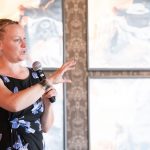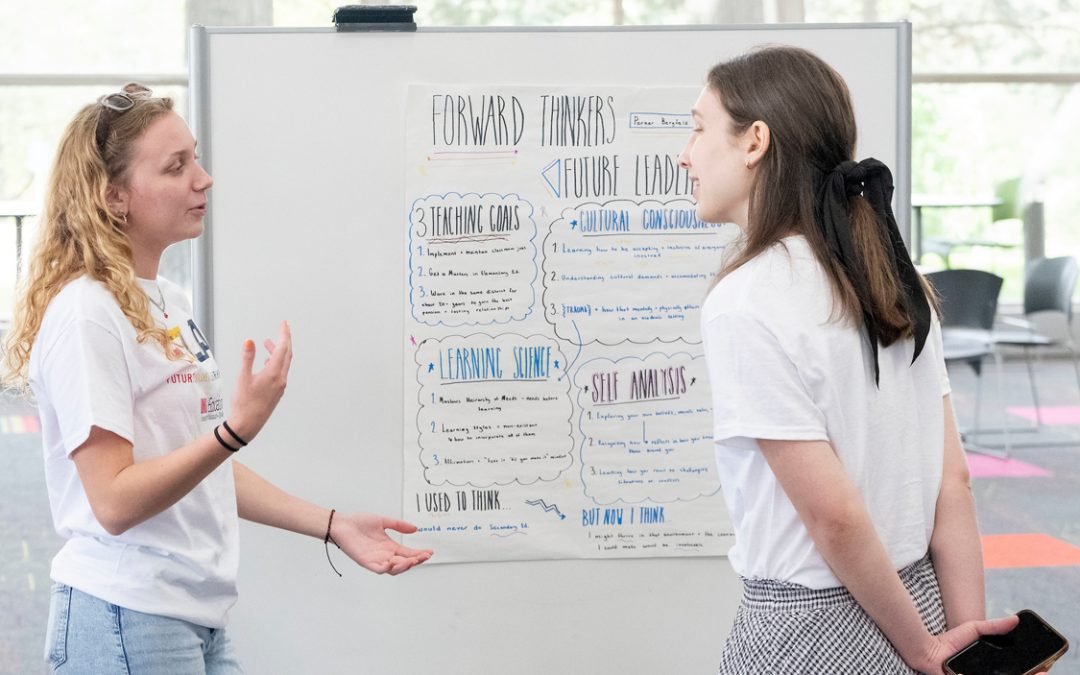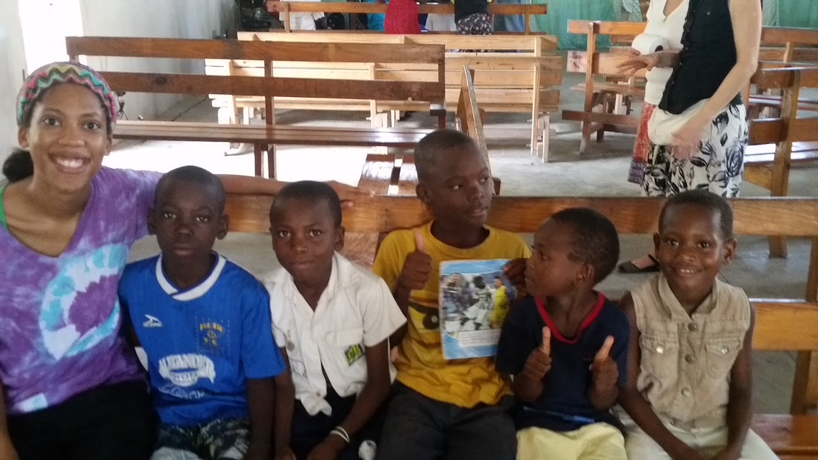
Optometry student Jasmine Hayes (at left) traveled to Haiti twice this past November and January in order to help deliver vision care to those in need. The trip was made possible thanks to the efforts of the Pennsylvania chapter of Volunteer Optometric Services to Humanity. (Photos courtesy of Jasmine Hayes and Kanesha McBee)
During one week this past November, University of Missouri–St. Louis student Jasmine Hayes was navigating her way through a normal semester – balancing course work, clinical shifts and other typical third-year responsibilities within her doctor of optometry program.
The very next, she found herself amid the traffic-filled and recently water-logged streets of Cap-Haïtien, Haiti.
Hayes had heard that other UMSL optometry students and alumni had participated in travel-abroad excursions to needy countries where they were able to provide vision services to people who may not otherwise receive care.
She became set on participating herself and began to investigate, not knowing that her own chance would be right around the corner.
As it turned out, the Pennsylvania chapter of VOSH International – an organization dedicated to humanitarian vision efforts – had a sudden opening for a trip to Haiti. In fact, the trip’s leader was UMSL optometry alumna Diane Wilson.
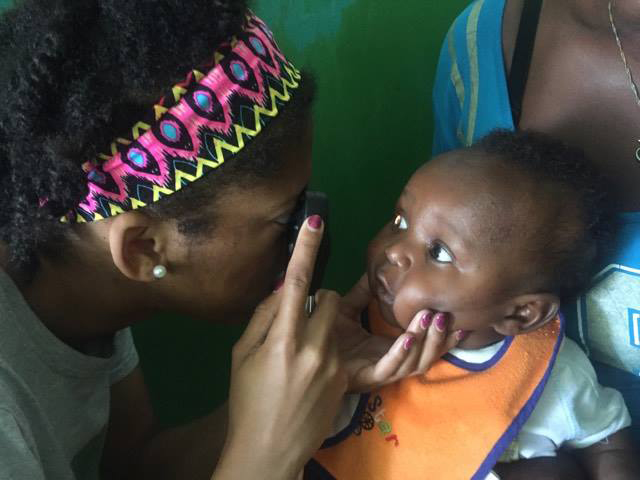
Jasmine Hayes estimated that during just one week in Haiti, her team of student and professional optometric volunteers saw around 1,300 patients.
Hayes jumped at the chance and within a week, she and Wilson – along with a small team of other eye-care professionals from around the United States – were off.
Roughly a year prior to Hayes’ impromptu trip, another UMSL optometry student, Kanesha McBee – now in the fourth and final year of her program – also traveled to the Caribbean, albeit with a little more notice. She went with a different humanitarian group to Haiti’s neighboring country, the Dominican Republic.
McBee had also been encouraged by other students’ travel tales.
“During my first year of optometry school I was in an SVOSH meeting, the student affiliate of VOSH International,” said McBee, “and they started talking about the different trips they had taken and how many patients they were able to help, as well as how many diseases they were able to see. After that meeting, I couldn’t stop thinking about it. My two passions are travel and helping people achieve vision, so the opportunity to do those things together was a dream come true.”
The reality of that dream in action, both students suggest, can be hard to put into words – hard to fully understand or grasp until it’s happening.
On Hayes’ trip, her team flew into Cap-Haïtien, which became their home base. From their hotel in the city center, they ate breakfast and dinner together each morning and evening, but during all of the hours in between, they traveled along dirt roads to outlying rural areas and set up their clinic in whatever space they were provided.
The challenges of providing care under such circumstances were many – and McBee’s group faced similar obstacles.
First, there was the sheer volume of people who needed help.
In Haiti, Hayes estimated, her group saw roughly 1,300 people in one week. In the Dominican Republic, McBee counted the number at around 900 in only four days.
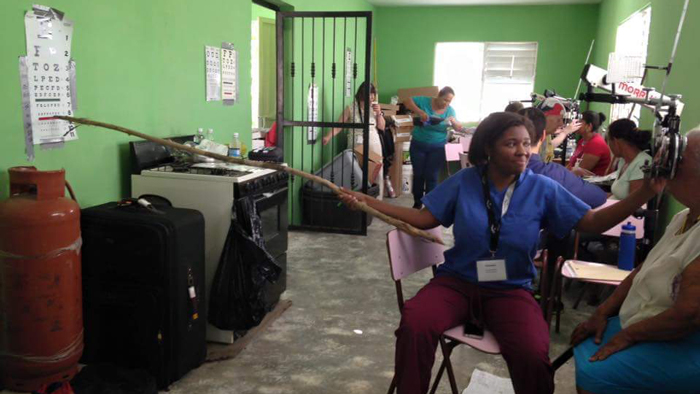
“My passion is helping people achieve vision,” said Kanesha McBee, who is planning another service trip to Honduras next month.
The patients are so numerous and far-reaching because eye-care services in this countries, Hayes said, are generally unaffordable and inaccessible for many folks. And – in some places – they simply don’t exist at all in the way they do in the U. S.
“Some individuals traveled over four hours to see us,” McBee said of her patients. “That just goes to show how important these trips are.”
The lack of available care also meant that the students were able to witness diagnoses they’d never had the chance to see before. Such exposure, while good for their medical expertise, was, at times, another challenge to adjust to.
“There was one patient I saw who was 22,” Hayes offered. “He had really advanced glaucoma, which is rare for young people to even get. In the U.S. – most likely – it would not have gotten to be that bad before we caught it. So, there were moments like that. I’m helping him and I’m thinking, ‘I’m 25 and this 22-year-old is one step away from losing his vision completely. If I lived here, that could have been me.’”
While a moment like that can be heartbreaking, Hayes said, there were others that were bursting with hope.
“There were people who were blind for years, but all they needed were to get cataracts removed,” McBee gave as one example. “Being able to identify a solution and refer them for services was remarkable.”
Yet one more hurdle that the students, doctors and other volunteers had to overcome resulted from the conditions in which they worked.
“In Haiti,” Hayes explained, “we were in whatever kind of space they gave us – an old school room, a church – and there wasn’t always electricity. A lot of times we would have a generator to charge up equipment or they would plug in fans for us, but then sometimes the generators stopped working so then we didn’t have that piece of equipment anymore. It’s not like clinic at UMSL where you can adjust the height of a chair or change lighting conditions. You have to learn how to work with what you have.”
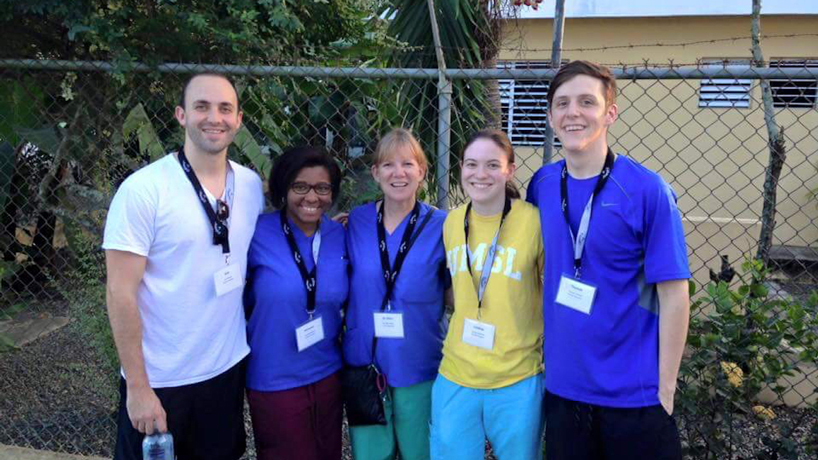
Kanesha McBee (second from left) is pictured here with fellow UMSL optometry students, as well as UMSL optometry alumna Ellen Weiss (center). Weiss led the group’s humanitarian vision efforts in the Dominican Republic in January 2016.
Such an improvisational mindset was also necessary for one final difficulty that both Hayes and McBee faced – the language barrier.
“When we started, I was nervous,” McBee said, “because I didn’t speak Spanish well and I thought to myself, ‘How am I going to help these people if I can’t even communicate with them?’”
Hayes had similar thoughts about her Haitian Creole-speaking patients. She said that while interpreters were sometimes available, it still wasn’t anywhere close to the automatic ease that comes from the luxury of a shared language.
“Typically, when we see patients,” Hayes said, “we are able to tell them, ‘This is exactly what I’m doing, this is why I’m doing it.’ And you’re able to warn people – ‘This is going to come close to your face. It won’t hurt; you don’t have to be afraid.’ That’s just not the case in these environments.”
Nevertheless, Hayes said, she was amazed at how trusting, fearless and willing the patients were. Their gratitude at the end of services was one of the easiest things to interpret. McBee agreed.
“One thing I learned,” she said, “is that having sight is the same in every language. The tears of excitement and the hugs I received after giving a patient a pair glasses – words can’t even describe how I felt.”
That feeling, McBee said, is a large part of the reason why she’s now hooked on delivering optometric services via humanitarian trips. In fact, she’s all set to travel again next moth – this time to serve patients in Honduras.
As for Hayes? Less than two months after her first journey to Haiti she went back again for another week. And over this year’s spring break, she’ll head to Westmoreland Parish in Jamaica to offer the same help and expertise that she’s continuing to develop in her classes at UMSL.
“We’re giving people the gift of sight,” Hayes said, offering one final thought. “To put a pair of glasses on a person and just see how their whole face changes, how it lights up – we’re giving them something, but really, in that moment, they’re giving us something, too. It was really rewarding to be able to see it.”












